2018 in Review: a recap of the Skeptical Science year
Posted on 1 January 2019 by BaerbelW
It's time for another year-in-review post, so here is an account of what the SkS-team was up to during 2018. As in previous recaps, this one is divided into several sections:
|
Involvement with the IPCC 1.5°C report Other publications and activities Website activities and social media What will 2019 bring? |
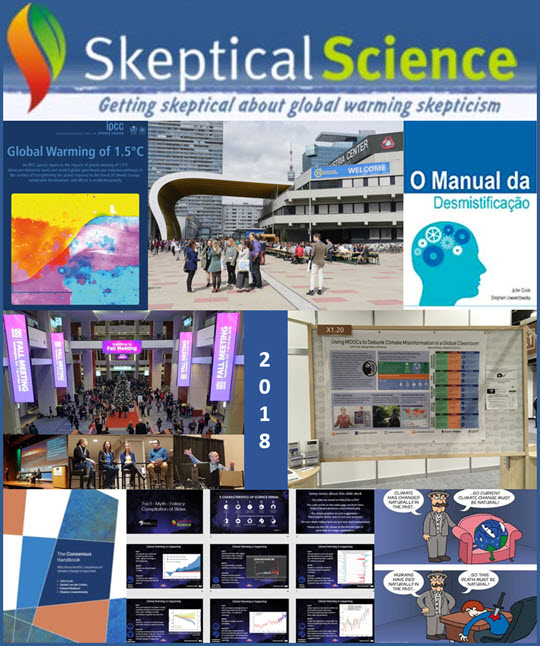 |
Involvement with the IPCC 1.5°C report
SkS members' involvement in the IPCC Special Report was a key achievement of 2018.
Mark Richardson was a contributing author on chapter 1 ("Framing and Context") of IPCC SR1.5 And, in a major development, Cowtan & Way (v2) was included as a fourth surface temperature dataset, given equal weight along with the traditional NASA, NOAA and HadCRUT series. Cowtan & Way was the main temperature series underpinning the regional warming analysis, while the Cowtan et al. (2015) model-observation comparison was also highlighted.
Thus, the following four papers figure quite prominently in this chapter (SkS authors in bold):
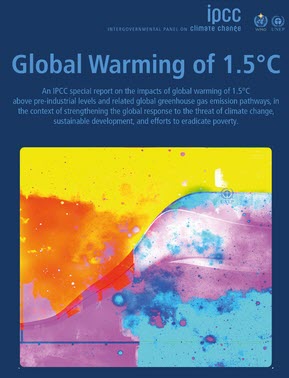 |
Coverage bias in the HadCRUT4 temperature series and its impact on recent temperature trends Kevin Cowtan and Robert G. Way, 2014 Quarterly Journal of the Royal Meteorological Society, 140(683), 1935-1944 Robust comparison of climate models with observations using blended land air and ocean sea surface temperatures Kevin Cowtan, Zeke Hausfather, Ed Hawkins,Peter Jacobs,Michael E. Mann, Sonia K. Miller et al., 2015 Geophysical Research Letters, 42(15), 6526-6534 |
Global temperature definition affects achievement of long-term climate goals
Mark Richardson, Kevin Cowtan, RJ Millar, 2018
Environmental Research Letters 13 (5), 054004
Reconciled climate response estimates from climate models and the energy budget of Earth
Mark Richardson, Kevin Cowtan, Ed Hawkins, and Martin B. Stolpe, 2016
Nature Climate Change, 6, 931-935
Scholary publications
Apart from having these papers featured in the IPCC 1.5°C report, several members of the SkS-team were lead- or co-authors of peer-reviewed papers published during 2018. Here is a list of some of them:
Understanding and countering climate science denial
John Cook
Journal & Proceedings of the Royal Society of New South Wales, 150(2), 207–219.
Deconstructing climate misinformation to identify reasoning errors
John Cook, Peter Ellerton and David Kinkead
Environmental Research Letters, 13(2), 024018
If you haven't watched it yet, here is the hilarious video abstract explaining the paper:
Hurricane Harvey links to Ocean Heat Content and Climate Change Adaptation
Kevin E. Trenberth, Lijing Cheng, Peter Jacobs, Yongxin Zhang, John Fasullo
Earth's Future
Statistical analysis of coverage error in simple global temperature estimators
Kevin Cowtan, Peter Jacobs, Peter Thorne, Richard Wilkinson
Dynamics and Statistics of the Climate System, 3(1), dzy003.
Interpretations of the Paris climate target
AP Schurer, Kevin Cowtan, Ed Hawkins, Michael E. Mann, V Scott, SFB Tett
Nature Geoscience 11 (4), 22
Evaluating biases in Sea Surface Temperature records using coastal weather stations
Kevin Cowtan, Robert Rohde, Zeke Hausfather
Quarterly Journal of the Royal Meteorological Society 144 (712), 670-681
Information content of OCO-2 oxygen A-band channels for retrieving marine liquid cloud properties
Mark Richardson, Graeme L. Stephens
Atmospheric Measurement Techniques, 11(3), 1515-1528
A fluctuation in surface temperature in historical context: reassessment and retrospective on the evidence
James S. Risbey, Stephan Lewandowsky, Kevin Cowtan, Naomi Oreskes, Stefan Rahmstorf, Ari Jokimäki, Grant Foster
Environmental Research Letters
The ‘pause’ in global warming in historical context: Comparing models to observations
Stephan Lewandowsky, Kevin Cowtan, James S. Risbey, Michael E. Mann, Byron A. Steinman, Naomi Oreskes, Stefan Rahmstorf
Environmental Research Letters
Other publications and activities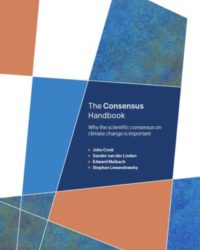
In March 2018 John Cook, Sander Van Der Linden, Ed Maibach and Stephan Lewandowsky published The Consensus Handbook. It summarizes research into how opponents of climate action have cast doubt on consensus, why that matters, and how we (including journalists) can respond. Speaking of the consensus, our paper from 2013 is still doing very well with more than 885,000 downloads by now while its 2016 follow-up study just crossed 390,000 downloads. Both papers consistenly show up among the 5 most read papers in IOP's Environmental Research Letters (ERL).
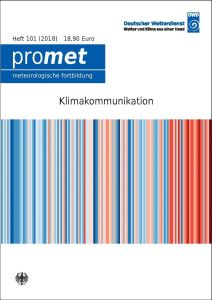 As a follow-up to the K3-conference in Salzburg mentioned in last year's recap, Stephan Lewandowsky and Bärbel Winkler were invited to contribute articles to a special edition focused on climate communication for the journal Promet of the German weather service (DWD). The articles are supposed to become publicly available online in April 2019 on the DWD-website. Bärbel published an English summary of her article as the blog post Discussing climate change on the net.
As a follow-up to the K3-conference in Salzburg mentioned in last year's recap, Stephan Lewandowsky and Bärbel Winkler were invited to contribute articles to a special edition focused on climate communication for the journal Promet of the German weather service (DWD). The articles are supposed to become publicly available online in April 2019 on the DWD-website. Bärbel published an English summary of her article as the blog post Discussing climate change on the net.
Members from our team again published articles in various other outlets with one quite unfortunate development being that The Guardian decided to discontinue all of its blogs in August 2018. This affected - with some delay! - Dana Nuccitelli's contributions to the blog "Climate Consensus - the 97%" which he wrote together with John Abraham. Dana published an article about their blog's demise in October. Luckily enough, Dana will still contribute roughly one article per month for the Guardian and now also writes for Yale Climate Connection!
Here is a bullet list of outlets where you can happen upon contributions from our team:
- Dana Nuccitelli - Guardian
- Dana Nuccitelli - Bulletin
- Dana Nuccitelli - Yale Climate Connections
- Stephan Lewandowsky - TheConversation
Our MOOC Denial101x
Denial101x was available throughout the year as one paced and three self-paced versions. Since first launching in 2015, almost 40,000 participants from over 180 countries have enrolled in our MOOC. We've received a lot of positive feedback with students letting us know that the course content will be a big help in their endeavours to inform others - be they family members, friends, colleagues or students - about the reality of human-caused climate change. At the moment, we are in the middle of a self-paced run which will stay open until 26 February 2019. There is still ample time to start now and work through the 7 weeks worth of lectures until then! For 2019 we only plan one self-paced run which will start sometime in March and then stay available well into 2020.
Leveraging the Fact-Myth-Fallacy list based on the Denial101x-lectures, Bärbel put together a slide-deck with one page for each debunking and an index-page utilising the short URL "code" for each rebuttal to quickly access them. Instead of a video, each slide includes a graphic to drive home the main point of the debunking. Several of the graphics were created by John Garrett (jg) specifically for this slide-deck. These have also been added to our graphics resources.
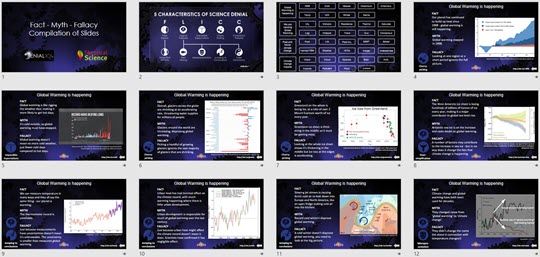 There's more information about the slide-deck in the accompanying blog post.
There's more information about the slide-deck in the accompanying blog post.
Other educational activities
In his role as research assistant professor at George Mason University’s Center for Climate Change Communication, John Cook developed a five-part webinar series in collaboration with the National Center for Science Education (NCSE) and the Alliance for Climate Education (ACE). The webinars showed educators how to use new lesson plans teaching key facts about climate change while addressing five of the most common climate myths. The webinars were recorded in July 2018 and are currently available via Vimeo: Turning Misinformation into Educational Opportunity. Even though the webinar is aimed at teachers in the United States of America the content may be of interest for others as well.
Conferences and presentations
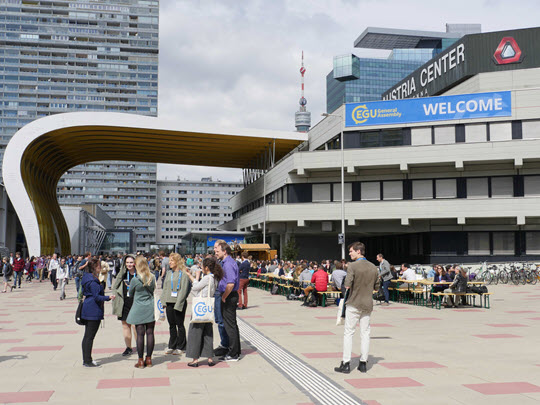 In April, Bärbel travelled to Austria's capital Vienna to participate in the week-long European Geoscience Union's General Assembly. On Monday afternoon Bärbel gave a presentation titled "How to communicate effectively when faced with myths and misinformation" in the session "Debunking myths and fake news: how can geoscientists fight misinformation and false claims". Session CL2.03 about detecting and attributing climate change earlier in the day also had some SkS involvement as Stephan Lewandowsky, Kevin Cowtan and Ari Jokimäki were among the co-authors of a paper Stefan Rahmstorf previewed. They had explored if there ever actually was evidence for a "hiatus" or "slowdown" in global temperatures. Their short answer: "No". On Wednesday, our Denial101x poster was featured in session EOS13 "Climate change education". For more about EGU 2018, please check out the detailed recap.
In April, Bärbel travelled to Austria's capital Vienna to participate in the week-long European Geoscience Union's General Assembly. On Monday afternoon Bärbel gave a presentation titled "How to communicate effectively when faced with myths and misinformation" in the session "Debunking myths and fake news: how can geoscientists fight misinformation and false claims". Session CL2.03 about detecting and attributing climate change earlier in the day also had some SkS involvement as Stephan Lewandowsky, Kevin Cowtan and Ari Jokimäki were among the co-authors of a paper Stefan Rahmstorf previewed. They had explored if there ever actually was evidence for a "hiatus" or "slowdown" in global temperatures. Their short answer: "No". On Wednesday, our Denial101x poster was featured in session EOS13 "Climate change education". For more about EGU 2018, please check out the detailed recap.
The Denial101x poster also got presented by Bärbel at the Swiss Geoscience Meeting in Bern on December 1 in symposium #16 "Climate change education and outreach".
In December, some team members met in Washington D.C. where this year's Fall Meeting of the American Geophysical Union took place at the Walter E. Washington Convention Center. Attendees from our team included John Cook, Peter Jacobs, Daniel Bailey, Collin Maessen. Mark Richardson and Howard Lee. John, Mark and Peter were actively involved in some of the sessions while Collin roamed the convention center in search of material for his Real Skeptic blog. Here is the list of sessions involving members from our team:
Peter Jacobs, John Cook, Aaron Huertas - Poster - Monday
PA11E-0825: Beyond Dueling Experts: Communicating the Importance of Knowledge-Based Consensus to Policymakers
Mark Richardson and others - Poster - Monday
A11I-2349: First Investigations of Drizzling Boundary Layer Cloud Properties with OCO-2 A-band Retrievals
John Cook - talk - Tuesday
PA21A-01: How inoculation, critical thinking, and parallel arguments can counter climate misinformation
Peter Jacobs and others - poster - Tuesday
PP21E-1452: A Pliocene perspective on ocean circulation and nutrients: the role of Pacific overturning on Earth system timescales
Karsten Haustein, Peter Jacobs, Kevin Cowtan, Zeke Hausfather (and others) - poster - Tuesday
A21H-2778: In pursuit of an earlier CMIP initialisation date ...
Mark Richardson was one of the conveners of a poster session on Tuesday (and the corresponding oral session A24C)
A21H: Climate Sensitivity and Feedbacks: Advances and New Paradigms I Posters
Karin Kirk, John Cook - eLightning - Thursday
PA42C-03: A Field Guide to Climate Contrarians: Strategies for Responding to Misinformation, Myths, and Misunderstandings
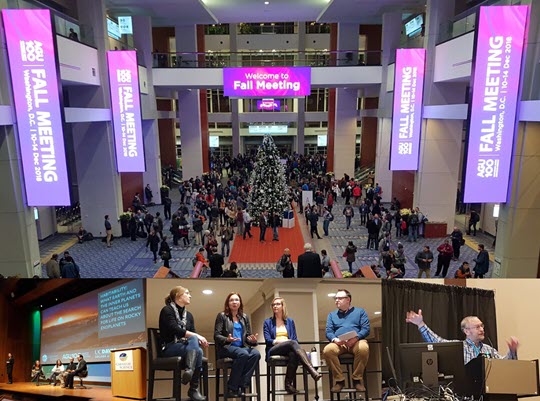 Some AGU-impressions caught on camera by Collin Maessen.
Some AGU-impressions caught on camera by Collin Maessen.
Website activities and social media
Several of our blog series kept getting published throughout the year with John Hartz leading the way with his weekly summaries and digests. Ari Jokimäki published his New Research post on a weekly basis and we had Dana Nuccitelli's and John Abraham's Guardian blog articles until those got discontinued as already mentioned above. Evan and jg continued their successful collaboration with 6 new analogies published during the year. Other members providing serveral articles were Riduna, David Kirtley, David Piepgrass and Bärbel Winkler.
Although somewhat lower than in 2017, the number of views for some of our rebuttals is still quite impressive. The top-3 each garner more than 500,000 thousand views across their avaiable versions (basic, intermediate, advanced) with "Consensus" again making first place (600,000+ views), "Sun" coming in second and "Model" third (both with 500,000 views). Runner-ups are "Impacts" (400,000+), "Past" and "Thermo" (each with 300,000+ views).
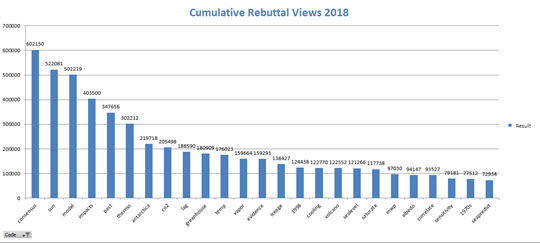 Cumulative rebuttal views across rebuttal versions for 2018 up to Dec. 28. Please click for larger image.
Cumulative rebuttal views across rebuttal versions for 2018 up to Dec. 28. Please click for larger image.
The Debunking Handbook is still by far the most downloaded of our resources with more than 50,000 downloads of the English version. The various translations got downloaded more than 10,000 times with over 4,000 of those being the German version. Other notable downloads include the Fact-Myth-Fallacy summary (5,000+) and the Guide to the Representative Concentration Pathways (RCPs) (8,000+).
Speaking of The Debunking Handbook, we just added the 12th(!) translation which was prepared by our Brazilian team tackling translations into Portuguese. Thanks for this work go to Claudia Groposo, Luciano Marquetto and Sabrina Leitzke.
Our Facebook page currently has about 188,000 followers. It provides breaking news and timely information about climate-related matters from around the world. Its format allows readers to comment on and discuss each post, albeit in a more abbreviated form than the comment threads on the SkS website. John Hartz creates the bulk of the FB posts and other members of the SkS team respond to questions submitted by readers on a regular basis.
On Twitter we have ca. 18,500 followers, up by more than 4,000 compared to two years ago.
What will 2019 bring?
John Cook started an Instagram account to share some of his "Cranky Uncles" themed cartoons and it might well be worth your time to check out crankyuncles.com for an inkling of what 2019 will bring! Here is a not very subtle hint:
Apart from that, we are fairly certain that we won't sit around twiddling our thumbs! There's still way too much need for us to tackle misinformation about human-caused climate change and we'll keep doing that for as long as it's needed. We count on your support for that!































 Arguments
Arguments






















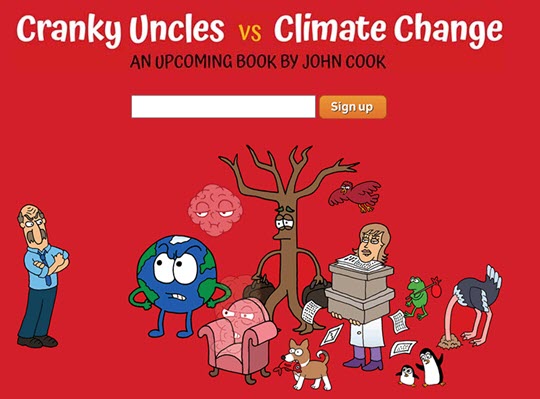









Hallo Bärbel,
ab und zu schreibe ich einen Dank an John Hartz, weil ich dessen Posts inzwischen am meisten nutze, aber zum Jahresanfang will ich auch Dir und SkS allgemein Danke für euer Engagement sagen.
Ich weiß nicht, wer die direkten Leser von SkS sind, aber ich vermute, die indirekten sind noch deutlich mehr .. Ich jedenfalls filtere SkS (und andere Quellen) und verlinke ein paar Posts oder Graphiken in einem kleinen Forum für die Bio-Selbsternte-Gärten in meiner Heimatstadt, das ich betreue und an anderen Stellen. Für Klein-Multiplikatoren wie mich sind Seiten wie SkS sehr wichtig (deshalb unterstütze ich das auch per Spende).
Angesichts der unguten Perspektiven (die ich als bedrohlich empfinde) sind insbesondere auch die Posts zur psychologisch sinnvollen Kommunikation hilfreich.
Viele Grüße,
Jonas.
Thanks for your feedback & donation, Jonas!
For those not able to read German, here is a quick translation of Jonas' comment
PS: Thanks for the translation and sorry for the additional work, maybe I should have written in english, but beyond expression thanks, I wanted to hint to the international audience and the excellent translations that I also often link to (e.g. the guide to skepticism, debunking handbook, posts ..).